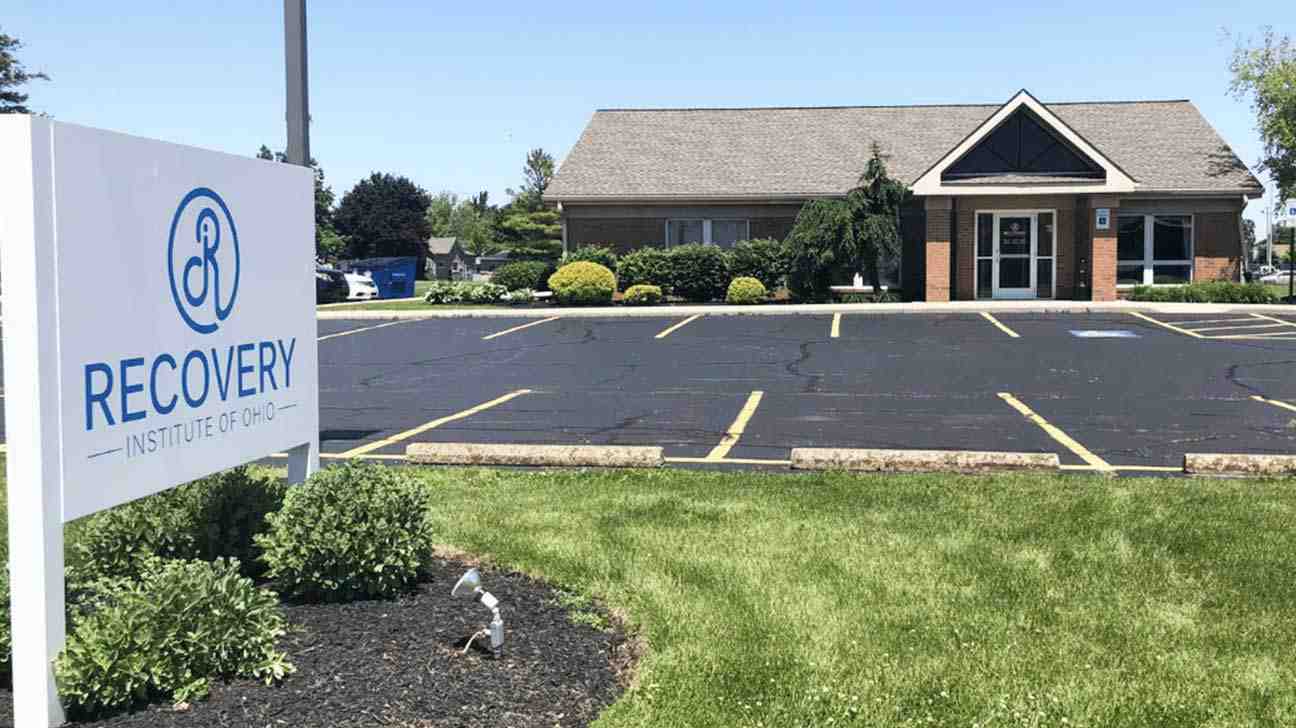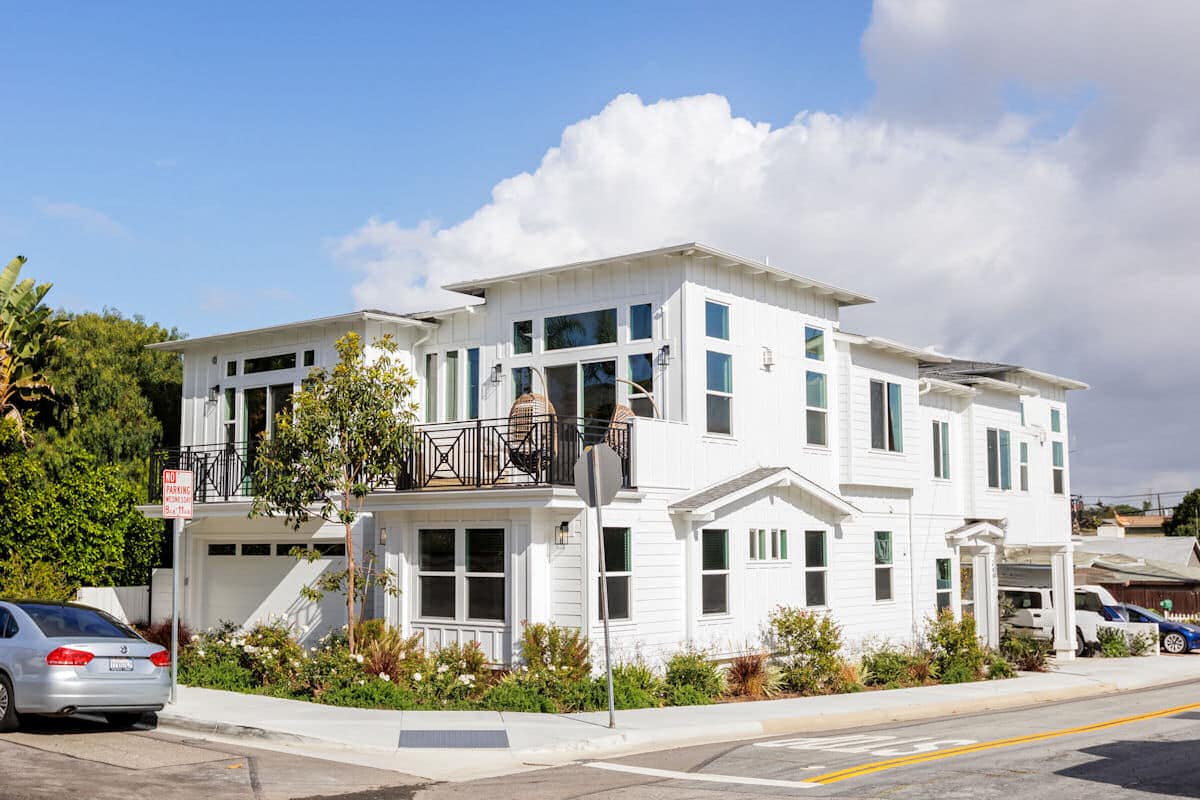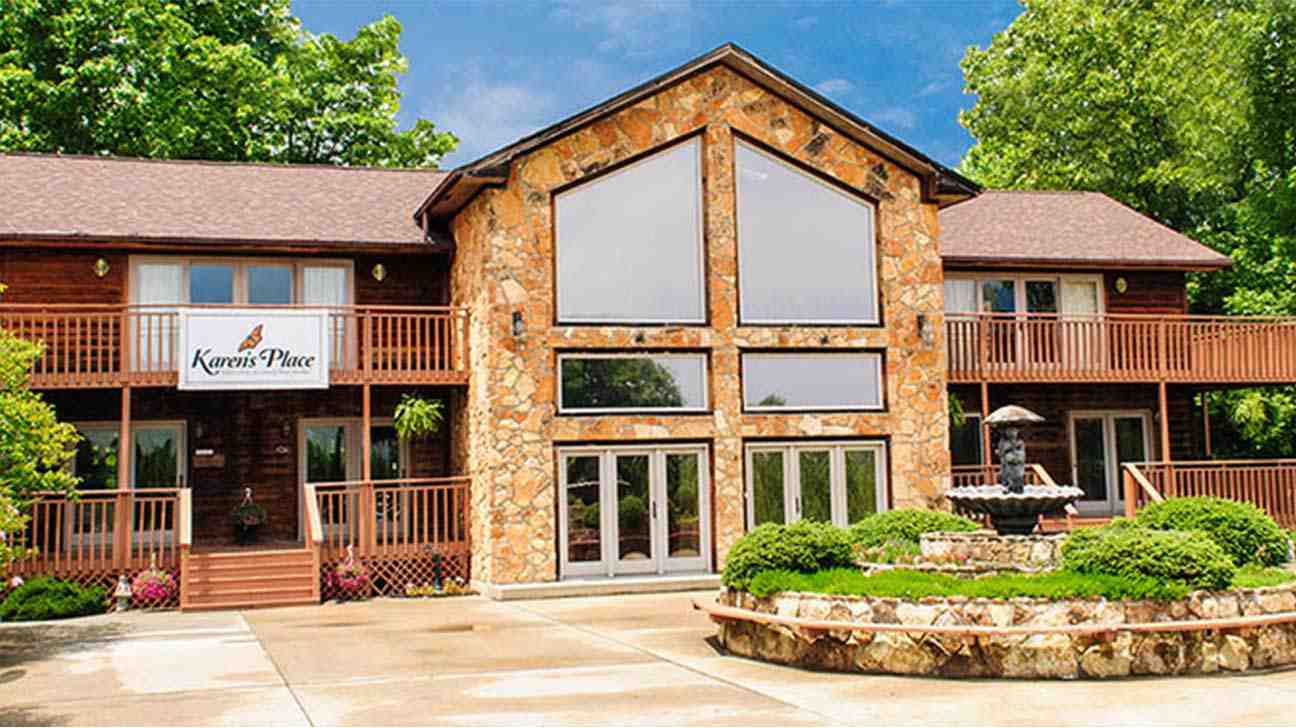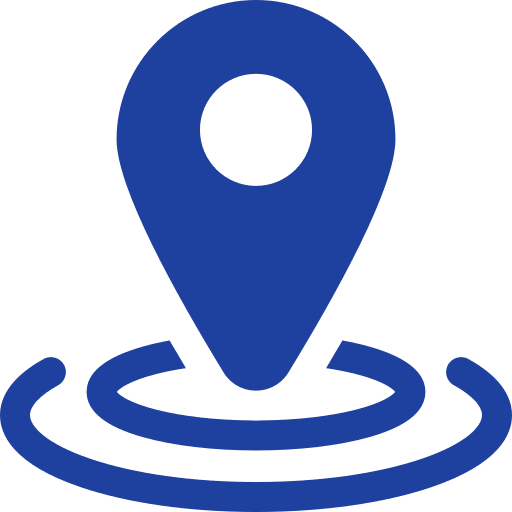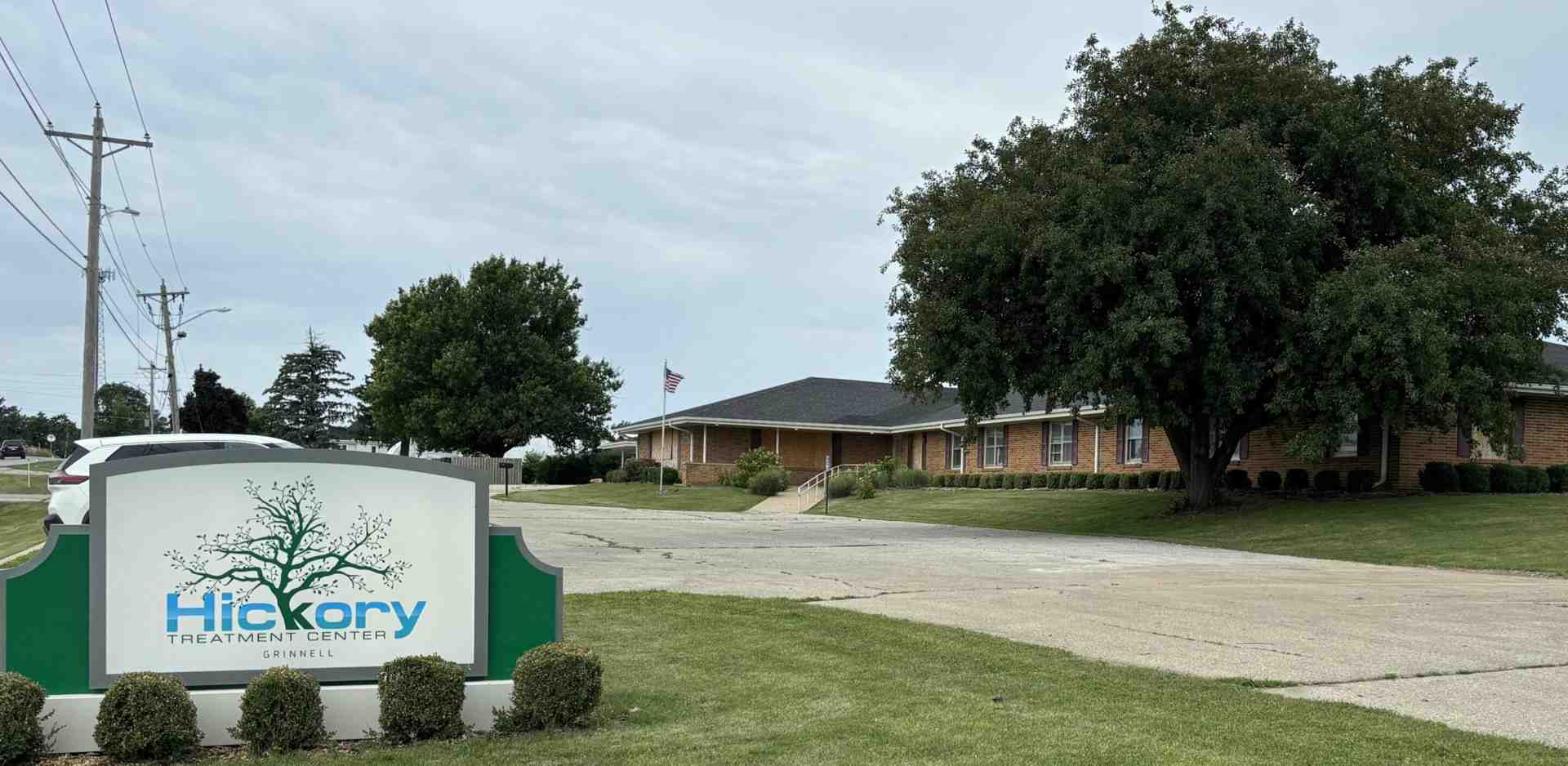
Finding Hope and Help: Your Guide to Drug Rehab in Iowa
Drug rehab Iowa provides a range of treatment options for those facing substance abuse. If you’re looking for help, it’s important to know that Iowa offers medical detox, inpatient and outpatient programs, and medication-assisted treatment. While costs vary, payment options include private insurance, Medicaid, and state-funded resources. Specialized programs are also available for diverse populations.
Each year, approximately 8,000 Iowans seek help for addiction. Though Iowa has one of the nation’s lowest illicit drug use rates, substance abuse remains a serious issue, particularly with alcohol, marijuana, and methamphetamines.
Recovery is possible. With professional support, thousands in Iowa overcome addiction annually. This path can feel overwhelming, but you don’t have to steer it alone.
This guide covers everything about drug rehab Iowa options—from identifying addiction signs to understanding treatment types, costs, and how to start. At Addiction Helpline America, we connect people with vital treatment resources. Our team understands the challenges Iowans face and is here to help you find the right path forward for yourself or a loved one.
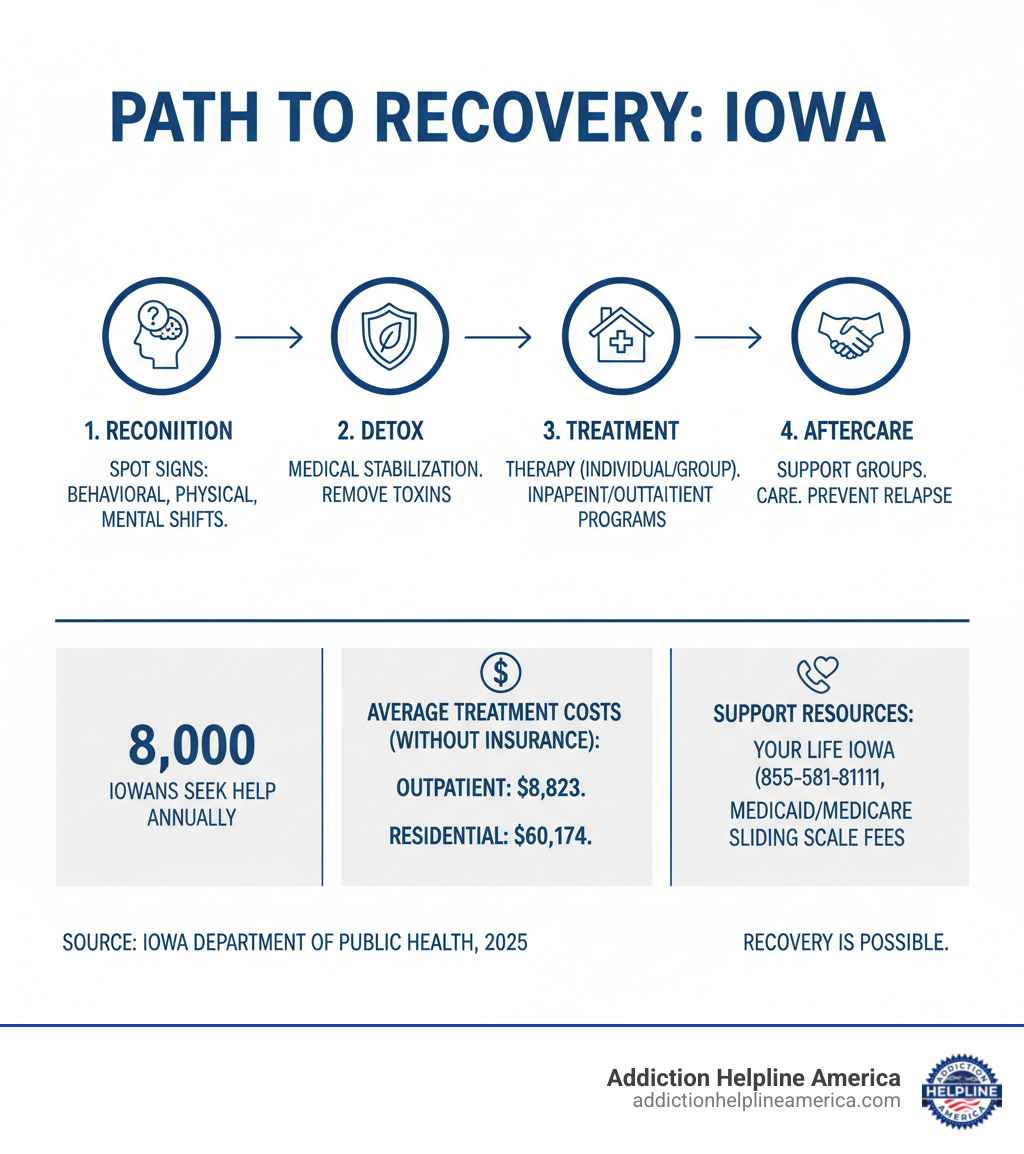
Understanding the Need for Rehab: Signs and Substance Abuse Trends in Iowa
Addiction is a disease that changes brain chemistry; it is not a moral failing or a matter of willpower. Recognizing the signs is the first step toward getting help.
Common signs of addiction include behavioral changes like neglecting responsibilities, legal or financial troubles, and shifting social circles. Physical signs can involve developing a tolerance (needing more of a substance for the same effect), experiencing withdrawal symptoms like tremors or nausea, and changes in appearance or sleep patterns. Psychological symptoms often include intense cravings, mood swings, anxiety, depression, and a loss of interest in once-enjoyed activities.
Iowa Substance Abuse Statistics
While Iowa has the second lowest rate of illicit drug use in the U.S., the state still faces significant challenges. Binge drinking is a major concern, with half of Iowans aged 18-25 reporting it in the past month. Alcohol, marijuana, and methamphetamines are the most commonly abused substances.
Methamphetamine use is rising dramatically, with lab seizures doubling between 2011 and 2019. In 2024, over 78,000 Iowans were admitted for methamphetamine use disorder treatment. Prescription drug abuse also remains a problem, with 108,000 Iowans reporting misuse in the past year. For more context, you can explore nationwide trends in illicit drug use and facts about alcohol consumption.
This has led to a sobering impact: an estimated 413,000 Iowans abused illegal substances in the past month, and the state saw 426 drug-related overdose deaths in 2021. A significant treatment gap exists, as many of the 590,000 Iowans with a substance use disorder are not receiving the drug rehab Iowa services they need.
Recognizing When to Seek Help
If you’re wondering if you or a loved one needs help, that question is often the answer. Are responsibilities being neglected? Has tolerance or withdrawal become an issue? Have attempts to quit failed? If substance use continues despite clear negative consequences, it’s time to seek a professional assessment. Reaching out is a sign of strength. Addiction is a progressive disease, but with the right support from drug rehab Iowa centers, recovery is absolutely possible. At Addiction Helpline America, we’ve seen thousands take this step and find healing.
Types of Drug and Alcohol Rehab Services in Iowa
Finding the right drug rehab Iowa service means understanding your options. Treatment isn’t one-size-fits-all; it’s a journey with different levels of care. Centers use the ASAM (American Society of Addiction Medicine) criteria to assess your history, health, and living situation to create a personalized treatment plan.

Medical Detoxification
For many, recovery begins with medical detox, which safely clears toxins from the body while managing withdrawal symptoms. This is not just “drying out.” Medically-supervised withdrawal involves 24/7 monitoring of vital signs and medications to ease symptoms like nausea, anxiety, and pain. This is crucial because withdrawal from substances like alcohol and benzodiazepines can be life-threatening, potentially causing seizures. While opioid withdrawal is not typically fatal, it is painful and difficult to endure without medical support. The average cost of medical detox in Iowa is $148,351, though insurance often covers a large portion of this life-saving care.
Inpatient and Residential Treatment
Inpatient treatment provides an immersive, 24/7 structured care environment away from triggers. For a typical duration of 30 to 90 days, you live at the facility, focusing entirely on recovery. The schedule includes therapy, educational groups, and wellness activities. A key benefit is peer support—connecting with others on the same path who understand your struggles. The average cost for long-term inpatient drug rehab Iowa programs is around $53,100.
Outpatient Treatment Programs (PHP, IOP, OP)
Outpatient programs offer flexibility for work or school, allowing you to live at home while receiving treatment. There are three main levels:
- Partial Hospitalization (PHP): The most intensive option, with treatment several hours a day, five to seven days a week. It’s a step down from residential care or for those needing serious support with a stable home life.
- Intensive Outpatient (IOP): Involves a few hours of therapy, three to five days per week, balancing treatment with daily responsibilities.
- Standard Outpatient (OP): The least intensive level, often involving weekly therapy sessions to maintain recovery while reintegrating into daily life.
These programs focus on relapse prevention and coping skills, with an average cost of $8,823 in Iowa.
Medication-Assisted Treatment (MAT)
MAT combines FDA-approved medications with counseling and behavioral therapies. This evidence-based approach is highly effective. The medication addresses the physical side of addiction by reducing cravings and normalizing brain chemistry, while therapy addresses the psychological aspects. For opioid use disorder, medications like Suboxone and methadone prevent withdrawal and block the effects of other opioids. For alcohol use disorder, medications like naltrexone can reduce cravings. MAT significantly improves long-term outcomes, reduces relapse, and helps people stay in treatment. Outpatient methadone treatment in Iowa averages around $7,839.
Navigating the Cost and Insurance for Drug Rehab Iowa
Cost is a major concern when considering treatment. While Iowa ranks 46th nationwide for addiction treatment affordability, it’s crucial to remember that the cost of not getting treatment is always higher. There are many ways to make care affordable.
Costs for drug rehab Iowa programs are influenced by the type of treatment (detox, inpatient, outpatient), program duration, and facility amenities. Without insurance, the average cost is $60,174, but most people do not pay this full amount.
The Average Cost of Drug Rehab in Iowa
Here’s how average costs break down by treatment type without insurance:
| Treatment Type | Average Cost in Iowa (without insurance) |
|---|---|
| Medical Detox | $148,351 |
| Long-Term Inpatient Rehab | $53,100 |
| Outpatient Addiction Treatment | $8,823 |
| Outpatient Methadone Treatment | $7,839 |
How to Pay for Treatment: Insurance and Other Options
Verifying your insurance benefits is the first step. The Affordable Care Act requires most plans to cover substance use disorder treatment. We can help you confidentially verify your plan’s coverage, determine out-of-pocket costs, and find in-network facilities to minimize your expenses.
- Private Health Insurance: Most Iowa rehabs accept major providers like Blue Cross Blue [Shield](http://provider.bcbs.com/), Wellmark, UnitedHealthcare, Optum, Cigna, Aetna, Coventry, Humana, and SisCo.
- State-Funded Options: Iowa Medicaid (Iowa Health Link) covers treatment for eligible low-income residents, and Medicare provides coverage for those 65+ or with certain disabilities. The Iowa Department of Health and Human Services also offers resources.
- Other Options: Many facilities offer sliding scale fees based on income or payment plans. Some non-profits may provide grants.
Don’t let cost stop you from seeking help. Our team at Addiction Helpline America specializes in navigating these financial complexities to find affordable, quality care.
What to Expect from Iowa Rehab Centers
Walking into a drug rehab Iowa center for the first time can be intimidating, but quality facilities are built on foundations that make recovery possible. The most effective programs use evidence-based practices—therapies proven to work—while treating the whole person: mind, body, and spirit. Look for accreditations from organizations like CARF or the Joint Commission, which signify a commitment to high standards of care.
Common Treatment Philosophies and Therapies
Recovery is built through therapy designed to help you understand the roots of your addiction and develop new coping skills.
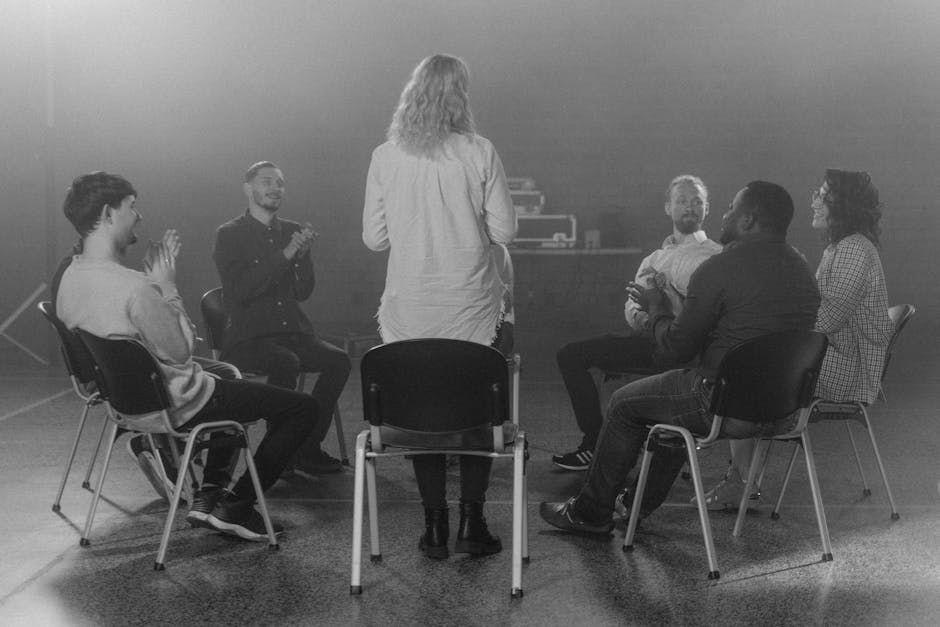
- Cognitive Behavioral Therapy (CBT): Helps you identify and challenge negative thought patterns that lead to substance use, replacing them with healthier responses.
- Dialectical Behavior Therapy (DBT): Especially helpful for intense emotions or trauma, DBT teaches skills in emotion regulation, distress tolerance, and mindfulness.
- Motivational Interviewing: A client-centered approach that helps you explore and strengthen your own motivation for change, rather than being lectured.
- 12-Step Facilitation: Many centers introduce the principles and peer support structure of 12-Step programs. Non-12-Step programs are also available, focusing on empowerment and scientific methods. The key is finding an approach that resonates with you.
A holistic approach is also common, incorporating nutrition, exercise, mindfulness, and art or music therapy to heal the whole person.
The Importance of Dual Diagnosis Treatment
About half of those with an addiction also have a co-occurring mental health condition like anxiety, depression, or PTSD. These issues are often intertwined, with substance use starting as a way to self-medicate. Treating only the addiction leaves the door open for relapse. Quality drug rehab Iowa centers offer integrated care, where a team of professionals addresses both your addiction and mental health simultaneously. Treating these underlying issues is essential for lasting recovery.
Specialized Programs for Diverse Needs
Your life experiences shape your recovery needs. Many Iowa centers offer specialized programs to provide targeted support.
- Programs for adolescents use family-centered, age-appropriate therapy to address the unique pressures teens face.
- Women-only programs create a safe space to address gender-specific issues like trauma, relationship dynamics, and motherhood.
- Men-only programs provide an environment where men can explore issues of masculinity, vulnerability, and societal pressures.
- Veterans programs offer trauma-informed care that honors the unique experiences of military service, often connecting veterans with peers who understand their journey.
- LGBTQ+ affirming care provides a judgment-free environment where individuals can address minority stress and identity-related trauma. In these programs, you can be yourself while you heal.
These specialized tracks recognize that your unique story matters and make treatment more transformative.
Your Path to Recovery: Starting Treatment and Finding Aftercare Support
Taking the first step toward recovery is a courageous decision. Fear and stigma are common, but asking for help is a sign of strength. You don’t have to do it alone.
How to Start the Process of Seeking Help at a Drug Rehab in Iowa
Starting the process for drug rehab Iowa can be broken down into simple steps:
- Initial Assessment: Your journey begins with a confidential call to a caring professional. You’ll discuss your substance use and mental health history to determine the right level of care (detox, inpatient, or outpatient).
- Insurance Verification: At Addiction Helpline America, we can quickly and confidentially verify your health insurance to clarify coverage, costs, and in-network facilities.
- Intake Process: Upon arrival at a facility, you’ll complete paperwork, undergo a medical evaluation, and discuss your treatment goals with staff. This creates a safe, structured environment for healing.
- Personalized Treatment Plan: The clinical team will develop a plan custom to you, outlining therapies, activities, and recovery milestones.
When packing, bring comfortable clothing, hygiene products, and necessary medications. Many facilities temporarily hold electronics to help you disconnect from outside stressors and focus completely on your recovery.
Life After Rehab: Ongoing Recovery Resources in Iowa
Graduating from a drug rehab Iowa program is the starting line for your new life, not the finish. Aftercare and ongoing support are crucial for long-term success.
- Relapse Prevention Plan: Before leaving, you’ll create a plan with your care team to identify triggers, outline coping strategies, and detail steps to take if you feel at risk.
- Sober Living Homes: These residences offer a supportive, drug-free bridge between rehab and independent living, providing structure and accountability.
- Community Support Groups: Mutual aid programs offer a safe space to share experiences and build connections with others in recovery. You can find a meeting online to locate groups throughout Iowa.
- State Resources: Your Life Iowa (1-855-581-8111) offers free, 24/7 confidential support. The Iowa HHS resources page also connects you to state-funded programs.
Our support at Addiction Helpline America doesn’t end when treatment does. We remain a resource for finding aftercare services, whether you’re in Cedar Rapids, Vinton, Lenox, or anywhere else in Iowa.
Conclusion

Your journey to recovery doesn’t have to be walked alone. Across Iowa, compassionate professionals are ready to help you reclaim your life from addiction. Drug rehab Iowa centers offer a full spectrum of care, from medical detox to residential and outpatient programs.
While Iowa faces challenges with methamphetamine, alcohol, and prescription drug abuse, what matters most is that help is available and recovery is achievable. Understanding your options—from costs and insurance to specialized programs for veterans, women, and LGBTQ+ individuals—empowers you to make the right choice.
Leaving rehab is the beginning of your recovery. Aftercare resources like sober living homes, community support groups, and state programs like Your Life Iowa provide the foundation for a new life. Recovery is a daily commitment supported by a community that understands.
At Addiction Helpline America, we are dedicated to walking this path with you. We offer free, confidential guidance to help you steer every step, from verifying insurance to finding the right facility. The courage to seek help is already inside you. Your story doesn’t end with addiction.
If you’re ready to begin, let us help you find a rehab center that fits your needs and start writing the next chapter of your life—one filled with hope and freedom.
Our helpline is 100%
free & confidential
If you or someone you care about is struggling with drug or alcohol addiction, we can help you explore your recovery options. Don’t face this challenge alone—seek support from us.
Programs
Resources
Will my insurance
cover addiction
treatment?
We're ready to help
Find the best
drug or alcohol treatment
center
Are you or a loved one struggling with addiction? Call today to speak to a treatment expert.

